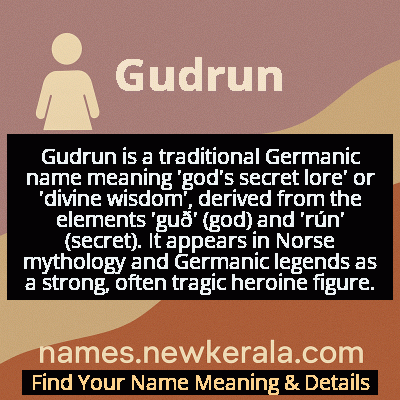Gudrun Name Meaning & Details
Origin, Popularity, Numerology Analysis & Name Meaning of Gudrun
Discover the origin, meaning, and cultural significance of the name GUDRUN. Delve into its historical roots and explore the lasting impact it has had on communities and traditions.
Name
Gudrun
Gender
Female
Origin
German
Lucky Number
4
Meaning of the Name - Gudrun
Gudrun is a traditional Germanic name meaning 'god's secret lore' or 'divine wisdom', derived from the elements 'guð' (god) and 'rún' (secret). It appears in Norse mythology and Germanic legends as a strong, often tragic heroine figure.
Gudrun - Complete Numerology Analysis
Your Numerology Number
Based on Pythagorean Numerology System
Ruling Planet
Uranus (Rahu)
Positive Nature
Strong sense of order, loyal, practical, and disciplined.
Negative Traits
Stubborn, overly serious, rigid, and prone to feeling restricted.
Lucky Colours
Blue, gray.
Lucky Days
Saturday.
Lucky Stones
Blue sapphire.
Harmony Numbers
1, 7, 8.
Best Suited Professions
Managers, engineers, accountants, organizers.
What People Like About You
Dependability, discipline, practicality.
Famous People Named Gudrun
Gudrun Ensslin
Political activist
Co-founded the Red Army Faction and became a central figure in West Germany's radical left movement
Gudrun Burwitz
Political figure
Remained an unrepentant neo-Nazi activist throughout her life despite her father's crimes
Gudrun Pausewang
Author
Won numerous literary awards including the German Youth Literature Prize for her socially critical works
Gudrun Schyman
Politician
Pioneered feminist politics in Sweden and founded the Feminist Initiative political party
Name Variations & International Equivalents
Click on blue names to explore their detailed meanings. Gray names with will be available soon.
Cultural & Historical Significance
Extended Personality Analysis
Individuals named Gudrun are often characterized by a remarkable blend of intellectual depth and emotional resilience that seems to echo their mythological namesake. They typically possess an analytical mind capable of seeing patterns and connections that others miss, combined with strong intuitive abilities that guide their decision-making. Gudruns tend to be profoundly loyal to their principles and loved ones, though this loyalty is tempered by a pragmatic understanding of human nature. They often display quiet determination rather than overt aggression, preferring to achieve their goals through strategic planning and persistent effort. Many exhibit a capacity for deep emotional experience while maintaining outward composure, creating an impression of mysterious depth. Their strength often emerges most clearly during crises, when they demonstrate unexpected resourcefulness and endurance. While they can be reserved in unfamiliar social situations, those who know them well appreciate their dry wit, insightful observations, and steadfast reliability. The personality associated with Gudrun suggests someone who values knowledge not just as information but as wisdom to be applied with discernment and ethical consideration.
Modern Usage & Popularity
In contemporary naming practices, Gudrun occupies an interesting niche as a traditional name that hasn't experienced the widespread revival seen with other vintage names. Its usage remains strongest in Germany, Austria, Switzerland, and Scandinavian countries, where it maintains cultural resonance without being overly common. Statistical data from Germany shows that while Gudrun was among the top 50 names for girls born in the 1920s-1940s, its popularity declined sharply in the postwar era. However, recent years have witnessed a modest resurgence, particularly among parents seeking names with mythological depth and cultural authenticity. In Iceland, Gudrún consistently ranks within the top 100 names, demonstrating its enduring appeal in Nordic cultures. The name's modern usage reflects a balance between honoring heritage and embracing strong female archetypes, appealing to parents who appreciate its historical significance without wanting an overly trendy name. Contemporary Gudruns often find their name serves as a conversation starter about Norse mythology and Germanic cultural history, creating connections to ancestral traditions in an increasingly globalized world.
Symbolic & Spiritual Meanings
The symbolic resonance of Gudrun extends far beyond its literal translation of 'divine knowledge' to encompass complex metaphorical meanings drawn from its mythological heritage. Symbolically, Gudrun represents the wisdom that emerges from suffering and loss—the profound understanding that can only be gained through navigating life's most challenging passages. She embodies the archetype of the woman who preserves cultural memory and family honor through storytelling and strategic action. Metaphorically, the name suggests the runes of ancient Germanic tradition—mysterious, powerful symbols that contain hidden knowledge accessible only to those willing to contemplate their depths. Gudrun symbolizes the transformation of grief into purpose, of betrayal into resilience, and of personal tragedy into collective wisdom. In a broader sense, the name represents the enduring power of feminine intelligence in contexts where overt power is denied, illustrating how wisdom and strategy can achieve what brute force cannot. The symbolic meanings associated with Gudrun continue to resonate in modern contexts, offering a powerful narrative about resilience, memory, and the quiet strength that shapes history from behind the scenes.

